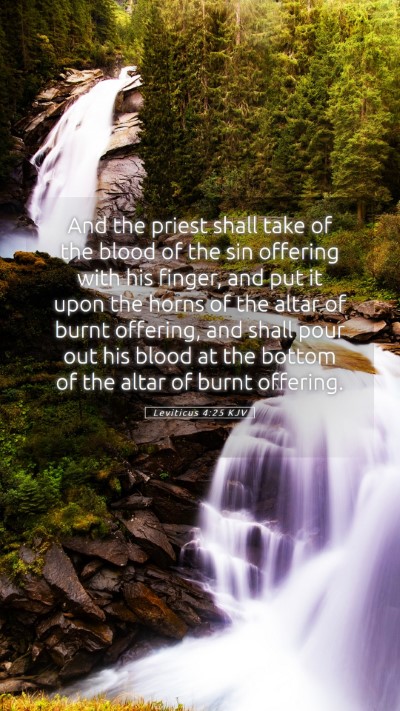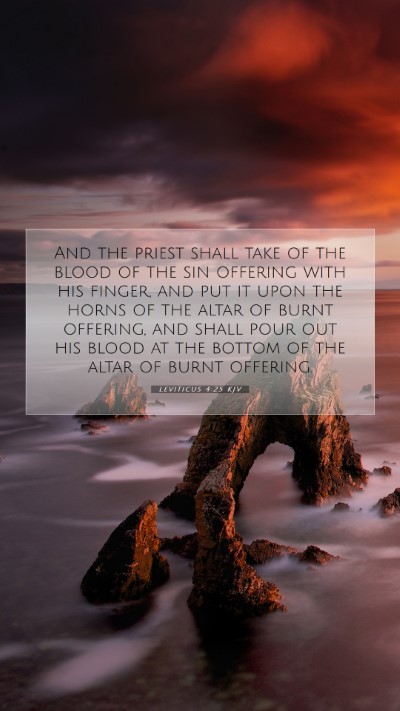Bible Verse Meaning: Leviticus 4:25
In Leviticus 4:25, we encounter a critical aspect of the sacrificial system outlined in the Old Testament. This verse reads:
"And the priest shall take of the blood of the sin offering with his finger, and put it upon the horns of the altar of burnt offering, and shall pour out his blood at the bottom of the altar of burnt offering."
Understanding the Sacrificial System
To fully grasp the meaning of this verse, it is essential to understand the broader context of the sacrificial system.
- Matthew Henry's Commentary: Henry emphasizes the importance of the atonement process and how it symbolizes the need for cleansing from sin. The act of the priest taking blood signifies the transfer of guilt and the necessity for a mediator.
- Albert Barnes' Notes: Barnes reflects on the role of the priest in interceding for the people, highlighting how the blood of the sacrifice was crucial for forgiveness and reconciliation with God.
- Adam Clarke's Commentary: Clarke discusses the significance of the blood in ancient Israelite worship, asserting that it represented life and the seriousness of sin. The application of blood on the altar is a vivid illustration of the cost of sin and the need for divine forgiveness.
The Symbolism of Blood
The blood in this context serves multiple purposes:
- Representation of Life: Blood symbolizes life in Scripture, indicating that atonement involves a life being given for another's sin.
- Means of Forgiveness: The priest's action of pouring the blood is a representation of God's mercy in forgiving sin, and it sets up a parallel to the greater sacrifice of Christ as understood in the New Testament.
- Establishing Holiness: By applying blood to the altar, the priest is consecrating the space, emphasizing the holiness required to approach God.
Application to Daily Life
Understanding this verse is not merely an academic exercise; it holds significant implications for believers today:
- Recognizing Sin: Believers are called to acknowledge their sins and the seriousness of breaking God's commandments, which is central to the concept of repentance.
- Value of Sacrifice: Just as the blood of the sacrifice was critical for atonement, Christians are encouraged to reflect on the sacrifice of Christ, which fulfills the Old Testament sacrifices.
- Call for Holiness: The application of blood to the altar serves as a reminder of God's holiness and the necessity for believers to pursue holiness in their lives.
Cross References
Leviticus 4:25 relates to several other verses that deepen the understanding of sin offerings and atonement:
- Hebrews 9:22: "And almost all things are by the law purged with blood; and without shedding of blood is no remission."
- Leviticus 16:15: "Then shall he kill the goat of the sin offering, that is for the people, and bring his blood within the veil, and sprinkle it upon the mercy seat, and before the mercy seat."
- Romans 3:25: "Whom God hath set forth to be a propitiation through faith in his blood, to declare his righteousness for the remission of sins that are past, through the forbearance of God."
Conclusion
The study and interpretation of Leviticus 4:25 offer rich insights for anyone seeking a deeper understanding of biblical principles surrounding sin, sacrifice, and redemption. Through careful analysis of this verse and its context, individuals can appreciate the weight of sin and the profound grace that comes through atonement.
As we engage with Scripture, we are reminded of the significance of blood sacrifice in the Old Testament and its fulfillment in the New Testament through Jesus Christ. This knowledge not only enhances our Bible study insights but also enriches our spiritual journey.


